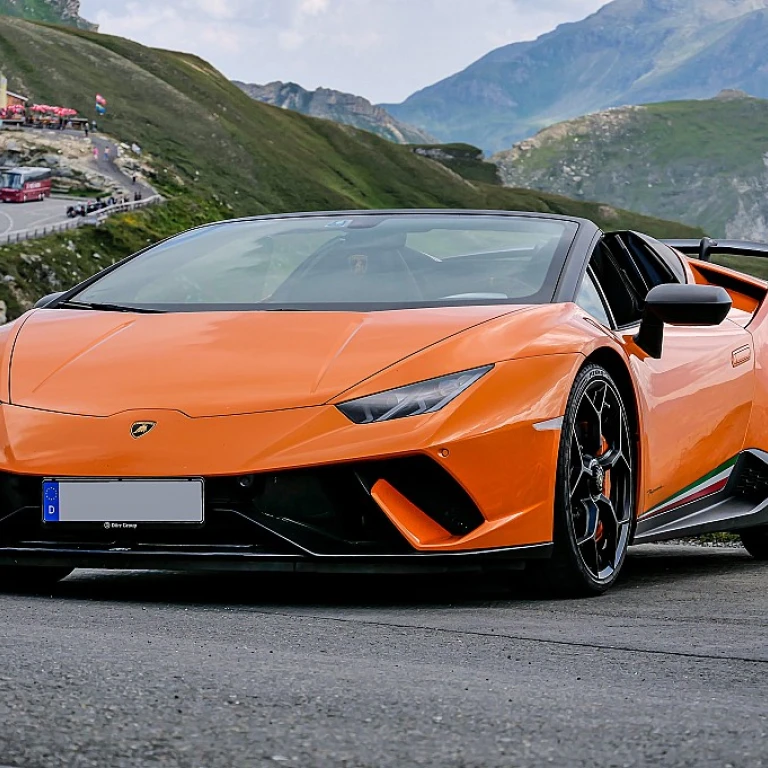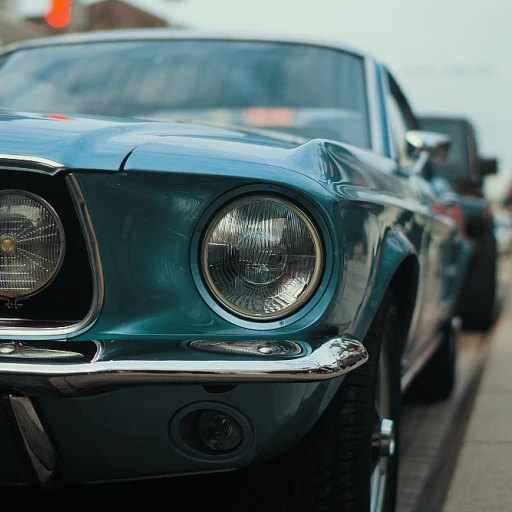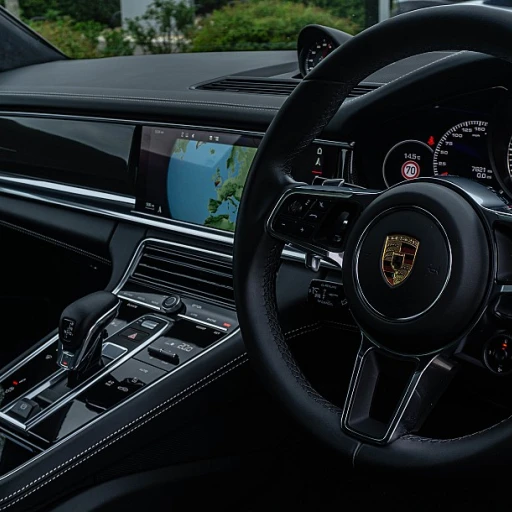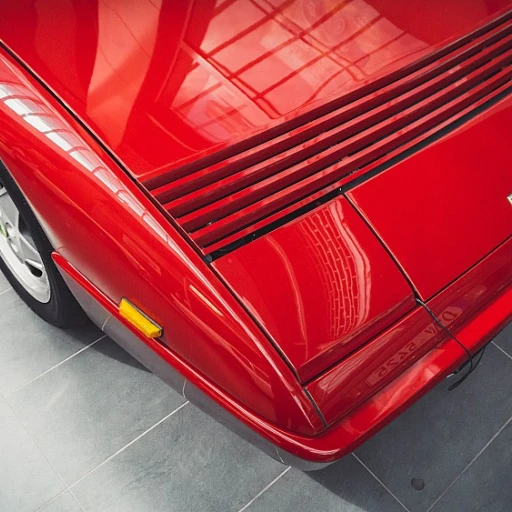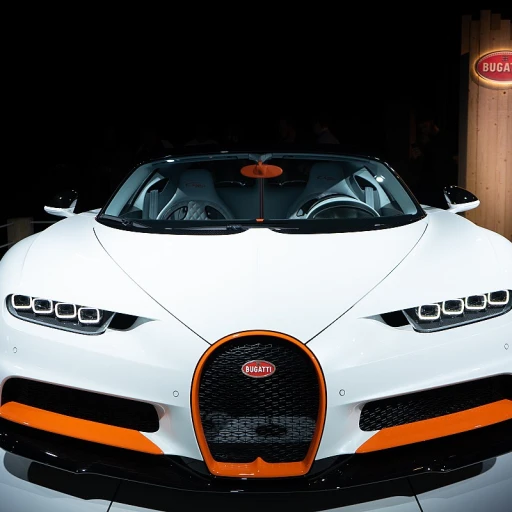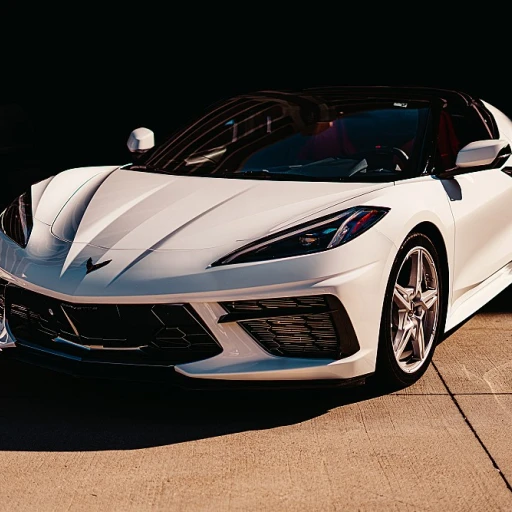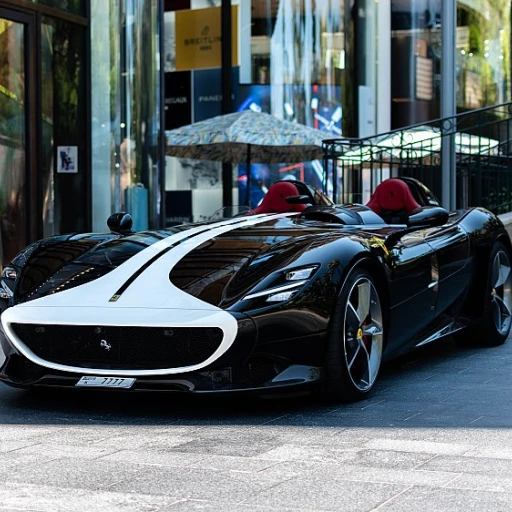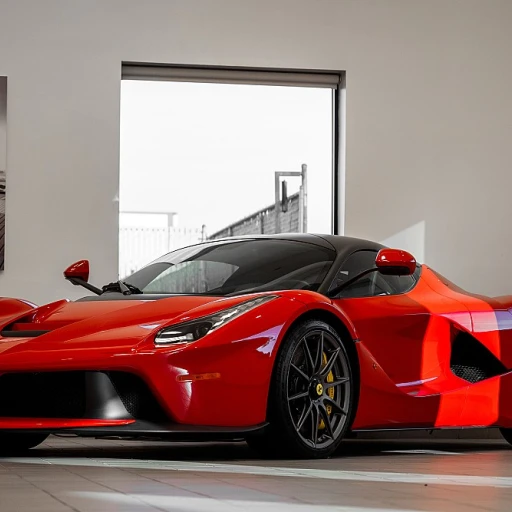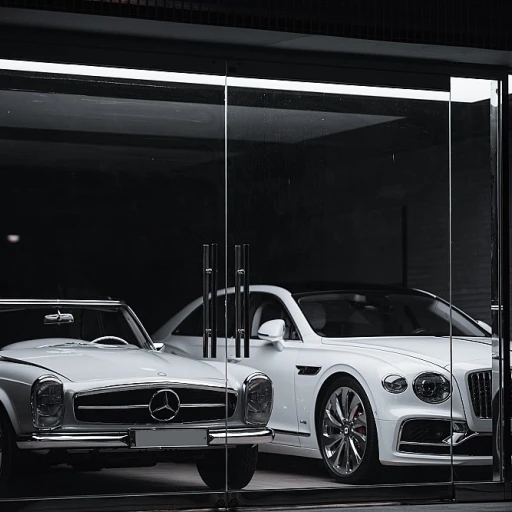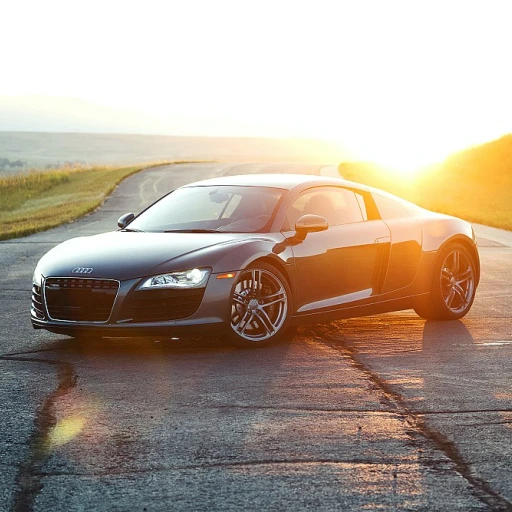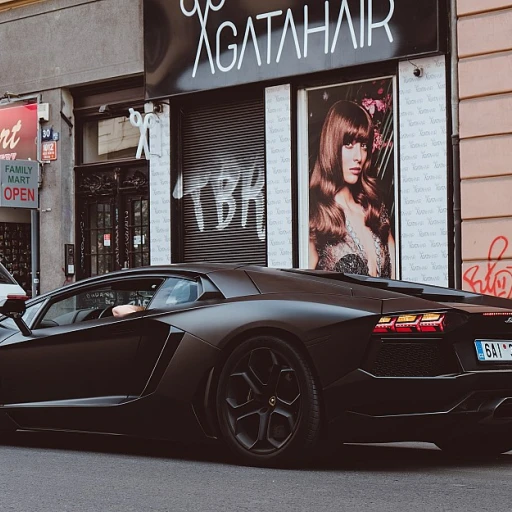
The evolution of luxury sports cars
A brief journey through time
Luxury sports cars have come a long way since their inception. Originally built for exclusivity and speed, these vehicles were cherished by the elite few. The beginnings were marked by brands like Ferrari, Aston Martin, and Porsche, who were not only making beautiful machines but also setting the bar for performance and luxury.
The golden era
The 1960s and 1970s were a transformative period for the luxury sports car market. Iconic models such as the Ferrari 250 GTO, the Aston Martin DB5, and the Jaguar E-Type were born. These cars are not only considered classics now but were also groundbreaking at their release, offering a perfect blend of performance and luxurious comfort.
Modern-day marvels
Fast forward to the 21st century, and the world of luxury sports cars has seen monumental changes. The introduction of advanced technology like the BMW i8's plug-in hybrid system, and the use of lightweight carbon fiber materials, as seen in many McLaren models, have changed the game. Today, these vehicles not only focus on power and luxury but also on fuel efficiency and environmental impact.
Legends that shaped the industry
Through the decades, several luxury sports cars have left a lasting impact. The Maserati Granturismo, with its impeccable design and performance, and the Porsche Cayman, known for its agility and speed, are prime examples. Each of these cars has contributed significantly to the evolution of luxury sports cars, and they continue to captivate enthusiasts and collectors alike.
Performance: what sets luxury sports cars apart
Exceptional performance and engineering
Luxury sports cars aren't just about looks and prestige; they're synonymous with high performance. A key factor setting these cars apart is their exceptional engineering and meticulous attention to performance details.
Engine power and engineering perfection
One common trait among luxury sports cars is their powerful engines. For instance, the Porsche Cayman's twin-turbocharged 3.0-liter V6 delivers a stunning 400 horsepower. The starting MSRP for a BMW Series 8 is relatively high, but you get top-tier performance featuring a 4.4-liter BMW M Performance TwinPower Turbo V-8.
Likewise, the Chevrolet Corvette is equipped with a 6.2-liter V8 that boasts 495 horsepower, making it a favorite among performance car enthusiasts.
Speed and agility
Speed and agility are essential when discussing luxury sports cars. The AMG Mercedes-Benz CLA 45, for example, combines an aerodynamic design with cutting-edge suspension technology, delivering unparalleled agility and handling. The vehicle's starting price may push into luxury car territory, but the performance it offers makes it a worthy investment.
Cutting-edge technology
Another critical aspect of luxury sports cars is the integration of advanced technologies. The Porsche Cayman, with its adaptive aerodynamics and sophisticated traction control systems, offers superior handling and stability. Additionally, cars like the Jaguar F-Type and Maserati Granturismo include features such as adaptive damping systems and electronic limited-slip differentials, enhancing both performance and safety.
The Toyota GR Supra blends traditional sports car elements with modern technology to create a vehicle that's both affordable and high-performing. Its 3.0-liter inline-six engine, turbocharged for extra power, exemplifies this combo of old and new.
Examples and case studies
One undeniable icon of performance is the Ferrari 488 Pista. With a 3.9-liter V8 engine providing 710 horsepower and the ability to go from 0 to 60 mph in just 2.85 seconds, it exemplifies what makes luxury sports cars extraordinary.
Another exemplary case is the McLaren 720S. Its carbon-fiber structure ensures a lightweight yet robust frame, contributing to its stunning speed and agility. With a top speed of 212 mph, it represents the pinnacle of automotive engineering.
These examples underline the extraordinary performance that differentiates luxury sports cars from regular vehicles.
For enthusiasts, there's nothing quite like experiencing the thrill of driving a black sports car. To learn more about the sensation and technology behind it, you can read our detailed review here.
Prestige and brand reputation
Prestigious brands in the luxury sports car market
When talking about luxury sports cars, the names that come to mind immediately are brands like Ferrari, Lamborghini, and McLaren. These brands signify more than just high-performance vehicles; they represent an elite status and a rich heritage of automotive excellence. For example, Ferrari, founded by Enzo Ferrari, has been synonymous with Formula One racing and unparalleled performance. The influence of this brand is evident in its limited production numbers and the high demand among car enthusiasts and collectors, contributing to its prestige.
Mercedes-Benz: a legacy of luxury
Mercedes-Benz has been a pioneer in the luxury car market for decades, offering vehicles that combine luxury, performance, and cutting-edge technology. The AMG division of Mercedes-Benz is particularly renowned for producing high-performance variants of the brand's standard models. The Mercedes-Benz AMG GT, for example, stands out in the sports car market with its twin-turbocharged 4.0-liter V8 engine, delivering a fascinating blend of power and precision, all while maintaining the luxurious interior features that the brand is known for.
Audi: combining performance with innovation
Audi's sports car lineup, particularly the R8, has made a significant impact in the realm of luxury sports cars. Known for its Quattro all-wheel drive system, the R8 boasts a naturally aspirated V10 engine that can match the thrills offered by its more expensive rivals. Audi's integration of advanced technology like the Virtual Cockpit and MMI Navigation adds to the brand's reputation for innovation and luxury.
BMW's commitment to driving pleasure
BMW's M series, especially models like the M4, represents the brand's dedication to driving pleasure with a focus on performance, design, and engineering excellence. The starting msrp BMW M4 lies approximately at $71,800. It features a refined 3.0-liter BMW M TwinPower Turbo inline 6-cylinder engine that offers a blend of power and efficiency, ensuring a thrilling driving experience. Journalists and car enthusiasts often praise BMW for its perfect balance of everyday usability and sports car excitement.
Porsche: the epitome of precision
Porsche's legacy in the luxury sports car market is secured with iconic models such as the 911 and the Cayman. The recent Porsche Cayman, offering a starting price that hovers around $60,500, epitomizes the brand's commitment to precision engineering and impeccable driving dynamics. Its mid-engine layout provides exceptional balance and handling, qualities that are highly valued among purists and racing aficionados.
Luxury sports cars as status symbols
Ownership of luxury sports cars is often equated with a particular status and lifestyle. A McKinsey & Company report highlights that purchasing a luxury sports car is often considered a mark of accomplishment and success. High-net-worth individuals consider brands like Aston Martin and Bentley not merely as transportation means but as key representations of their personal achievements and taste.
The real essence of luxury sports cars lies in their ability to blend performance with prestige seamlessly. From the powerful engines to the seductive designs, each brand showcases its unique take on luxury and performance, thus establishing a distinct identity in the highly competitive automotive industry.
Cutting-edge technology and innovation
Technological marvels behind luxury sports cars
Luxury sports cars aren't just about speed and a sleek design—innovation and advanced technology are at their core.
High-performance engines
These cars often boast twin turbocharged engines that enhance power while maintaining fuel efficiency. For example, the latest Bentley Continental includes a 6.0-liter W12 engine,1 capable of producing up to 650 horsepower. Meanwhile, the Audi R8 features a naturally aspirated V10 engine, offering an impressive top speed of 205 mph.2
Advanced driver-assistance systems
These vehicles often come equipped with cutting-edge driver-assistance systems (ADAS) such as the Porsche InnoDrive, which adapts vehicle speed and gear changes to suit road conditions.3 The new Mercedes-Benz S-Class even features a semi-autonomous driving mode powered by its advanced sensors and AI.
Lightweight materials
The use of lightweight materials such as carbon fiber and aluminum significantly boosts performance. The McLaren 720S employs a carbon fiber monocoque structure, decreasing its weight to achieve a 0-60 mph time of just 2.8 seconds.4 Luxury brands like Lamborghini have even developed their own advanced composites to push the boundaries further.
Luxurious interiors with state-of-the-art technology
The interiors blend opulence with innovation. Take the Rolls-Royce Phantom; its Starlight headliner recreates a night sky using thousands of fiber optic lights.5 The Maserati Granturismo offers a user-friendly infotainment system with a sleek touch screen and voice recognition technology, making it both luxurious and practical.
Hybrid and electric drive systems
Electric and hybrid systems are becoming increasingly common in luxury sports cars. The Porsche Taycan, for example, is an all-electric sports car that delivers up to 750 horsepower and a top speed of 161 mph.
Similarly, the BMW i8, a plug-in hybrid, combines an electric motor with a turbocharged engine to offer both stellar performance and improved efficiency.6
In essence, the meld of performance, luxury, and advanced technologies makes these cars not just vehicles, but works of art on wheels. The continuous innovation and the strive for perfection keep these cars at the pinnacle of automotive engineering.
Luxury sports cars and their market value
Market value dynamics
Luxury sports cars often come with a hefty price tag, but was makes them worth so much? The market value of these vehicles isn’t just dictated by their sticker price; it's influenced by demand, brand reputation, performance, and the exclusivity factor. Luxury brands such as Ferrari, Aston Martin, and Porsche have cultivated an aura around their sports cars, creating a magnetic pull for collectors and enthusiasts alike.
Price fluctuations
Annual reports from the luxury car market reveal that prices for high-end sports cars can fluctuate based on economic conditions, technological advancements, and market trends. For example, the Kelley Blue Book reports that a Porsche 911 can retain up to 60% of its value even after three years of ownership. Meanwhile, brands like Ferrari often see an appreciation in value quicker due to their limited production runs and exclusivity.
Experts' insights
According to Jeremy Acevedo, a car market analyst from Edmunds, “Luxury sports cars tend to defy traditional depreciation trends mainly due to their branding and the emotional appeal they hold. It's not merely transportation; its craftsmanship, performance, and heritage that drive their value.”
Impact of limited editions
Limited edition models often command a premium due to their scarcity. The Mercedes-Benz AMG GT Black Series, for instance, had only a few units produced, instantly making it a collector’s dream and doubling its value on the resale market. The allure of owning something rare boosts market value significantly.
Case studies
Look at the classic Jaguar E-Type, once praised by Enzo Ferrari as “the most beautiful car ever made.” These models have seen their values skyrocket, turning them into lucrative investments. A well-maintained model can now fetch over $100,000, which is a significant jump from their original price.
Performance metrics and value
Performance metrics such as top speed, engine specifications, and acceleration (0-60 mph times) also deeply influence market values. For example, the Bugatti Chiron, known for its 1,500 horsepower engine, commands a $3M starting MSRP, highlighting how performance integrates with market valuation.
Brand loyalty
BMW and its M Series, or Audi with its RS models, have garnered fervent fan bases. Brand loyalty also plays a considerable role in market value. According to a study by J.D. Power, 56% of luxury sports car owners are repeat buyers, showing the strong influence of brand loyalty on market dynamics.
Beyond the fancy statistics and expert opinions, luxury sports cars have another allure: They symbolize dreams, power, and prestige, making them more than just vehicles—they're assets.
Fuel efficiency and environmental considerations
Eco-friendly luxury: the green revolution
Luxury sports cars are known for their breathtaking speed and impeccable design, but recent trends show they are also going green. As climate change continues to take center stage, manufacturers are under pressure to innovate and create more fuel-efficient, environmentally-friendly vehicles. This drive toward sustainability has led to impressive advancements in hybrid and electric luxury sports cars without compromising the performance that enthusiasts crave.
Hybrid beasts: eco-friendly performance
Hybrid technology is playing a significant role in revolutionizing the luxury sports car industry. The Ferrari LaFerrari is a prime example, combining a V12 engine with a KERS electric motor. This powerhouse not only reduces emissions but also boasts a combined power output of 950 horsepower. Similarly, the Porsche 918 Spyder features a 4.6-liter V8 engine paired with two electric motors, achieving a remarkable 887 horsepower and an all-electric range of approximately 12 miles.
Electric dreams: the rise of the zero-emission sports cars
Electric luxury sports cars are emerging as the future of the high-performance automotive sector. The Rimac C_Two, an all-electric hypercar, stands out with its astonishing specs: a 1,914 horsepower engine, 0 to 60 mph in just 1.85 seconds, and a top speed of 258 mph. This zero-emission vehicle leads the charge in reducing the carbon footprint without compromising on thrills.
Tesla's Roadster also deserves a mention, boasting a top speed of over 250 mph and acceleration from 0 to 60 mph in 1.9 seconds, all while being fully electric. The shift towards electrification showcases a blend of cutting-edge technology and a commitment to the environment.
Consumer trends: prioritizing fuel efficiency
Consumers are increasingly prioritizing fuel efficiency alongside luxury and performance. A study by J.D. Power revealed that 62% of luxury car buyers consider fuel efficiency a critical factor when purchasing a new vehicle. This shift in preferences is pushing brands like BMW, Mercedes-Benz, and Audi to integrate more plug-in hybrid and fully electric models into their lineup.
Luxury sports cars meeting modern standards
Despite their reputation for power-hungry engines, modern luxury sports cars are making strides in fuel efficiency. For example, the BMW i8 achieves an impressive 69 MPGe (miles per gallon equivalent) while offering a sleek, futuristic design. The Audi R8 V10 Performance has also improved its fuel efficiency with technological advances, ensuring that luxury does not come at the cost of our environment.
Case studies: brands leading the charge
Brands like Aston Martin and Jaguar are making significant investments in developing greener vehicles. The Aston Martin Rapide E, the company's first electric model, and Jaguar's I-PACE, an all-electric SUV, are paving the way for a more sustainable future without sacrificing the essence of luxury and speed.
In summary, the landscape of luxury sports cars is shifting towards sustainability, driven by consumer demand and technological advancements. As manufacturers continue to strike a balance between performance and environmental responsibility, the future of luxury sports cars looks not only thrilling but also eco-friendly.
Case studies: iconic luxury sports cars
Timeless icons of elegance and speed
In the universe of luxury sports cars, certain models stand out not just for their performance and prestige, but for their sheer iconic status. These vehicles have left an indelible mark on automotive history, setting standards and becoming benchmarks in their class.
Ferrari 250 GTO: the holy grail of classic sports cars
When talking about iconic luxury sports cars, the Ferrari 250 GTO is often the first to come to mind. Manufactured between 1962 and 1964, this legend’s rarity and groundbreaking design make it a collector's dream. Only 36 units were built, each priced at $18,000 at the time of release. Today, it's considered one of the most expensive cars in the world, with a record sale of $70 million.
Porsche 911: the enduring symbol of sports excellence
Few cars have managed to sustain their appeal over decades like the Porsche 911. Introduced in 1964, the 911 has evolved while maintaining its distinctive design and exceptional performance. It's a poster child for precision engineering, with models like the 911 Carrera offering a 0-60 mph time of just over 3 seconds and a top speed of around 200 mph. The base model starts at an MSRP of approximately $101,200.
Aston martin db5: James Bond's choice
The Aston Martin DB5 gained fame through its association with James Bond films, first appearing in “Goldfinger” in 1964. Beyond its Hollywood ties, the DB5 is celebrated for its elegant design and impressive performance. It continues to be a coveted item, especially among classic car enthusiasts.
Chevrolet corvette: america's sports car
The Chevrolet Corvette has been a symbol of American automotive ingenuity since its debut in 1953. The latest models, like the Chevrolet Corvette Stingray, blend powerful performance with sleek design, featuring a mid-engine layout and a starting MSRP of around $60,995. With 495 horsepower and a 0-60 mph time of 2.9 seconds, it's a remarkable bargain in the luxury sports cars segment.
Emerging icons: the new wave of luxury sports cars
As we move forward, new contenders continue to challenge the supremacy of these legends. The Toyota GR Supra, for instance, offers a blend of performance and affordability with a starting price of about $42,000. The Maserati Granturismo, on the other hand, brings Italian elegance and performance together in a package starting at approximately $134,300.
Conclusion
Timeless icons like the Ferrari 250 GTO, Porsche 911, Aston Martin DB5, and Chevrolet Corvette have defined the luxury sports cars market. They are testimonies to the perfect blend of performance, design, and brand prestige that makes these vehicles everlasting symbols of luxury and speed.
The future of luxury sports cars
Emerging technologies and innovations
Luxury sports cars are paving the way for groundbreaking advancements in technology. Take for instance, the integration of AI and machine learning to enhance driver safety and vehicle performance. BMW's i4 Concept showcases their drive towards autonomous capabilities and electric mobility. Mercedes-Benz continues to innovate with their MBUX Hyperscreen, a revolutionary infotainment system stretching across the dashboard. These advancements illustrate a future where cars are not only fast, but also smart.
Increased focus on sustainability
The shift towards environmentally friendly technologies is reshaping the landscape of luxury sports cars. Electric and hybrid models are rapidly gaining popularity. For example, the Porsche Taycan, an all-electric sports car, pushes the boundaries of performance while being environmentally conscious. Studies indicate that the market share of electric vehicles could reach up to 50% by 2030, driving brands to invest heavily in sustainable innovations.
Evolution of design and materials
Future luxury sports cars will likely feature even more advanced lightweight materials, improving both performance and fuel efficiency. McLaren's use of lightweight carbon fiber in their 720S is a prime example of how luxury sports car manufacturers are integrating state-of-the-art materials without compromising on strength or style. Such innovations also translate to better handling and quicker acceleration, essential elements for any sports car enthusiast.
Global market trends
The luxury sports car market is expanding globally, with emerging markets contributing significantly to sales. For instance, data from a 2022 Statista report emphasizes the growing demand in regions like Asia and the Middle East. This global surge is due to increasing disposable incomes and a rising preference for high-performance vehicles.
Customization and personalization
Customization is becoming a defining feature for luxury sports cars. Brands like Ferrari and Aston Martin offer tailored experiences, allowing buyers to personalize nearly every aspect of their vehicle. This trend towards personalization caters to the desire for uniqueness, ensuring each car feels exclusive and one-of-a-kind.

